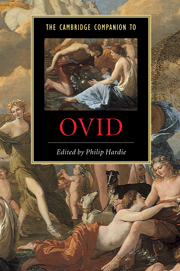15 - Ovid in English translation
from Part 3 - Reception
Published online by Cambridge University Press: 28 May 2006
Summary
Thenne it is a gret thynge to hym that secheth to know thentendement of Ovyde and he ought tendyne & sette hys hye corage to contynuel estudye & to take payne & dilygence to rumyne and chewe hys cudde and enquyre that the sayd poete hath devysed and dysputed of natures or of maners and of gestes.
(William Caxton, 'Proheme' to Ovyde hys Booke of Methamorphose, c. 1483)I could go on and on with these scientific facts. If it wasn't so late I'd tell you a whole lot more.
(Michael Longley, 'According to Pythagoras')There are sections taken directly from his work in the poetry of Chaucer and Gower, but translation of Ovid into English as a distinct process starts in the cradle of printing, with William Caxton’s version of the Metamorphoses in 1483 and Wynkyn de Worde’s Flores de Arte Amandi in 1513. It traces a path through the history of publishing, its latest manifestations being phenomena of the modern industry: the Loeb parallel text, the Penguin Classic, and the Faber and Faber poetry volume. Arthur Golding’s translation of the Metamorphoses (1565–7) is one of several translations in his period: Turbervile’s Heroides (1567), Churchyard’s Tristia (1572), and Underdowne’s Ibis (1569) follow soon after. Each text has its own origins, Golding’s being dedicated to the Earl of Leicester under whose patronage various translation projects were under way.
- Type
- Chapter
- Information
- The Cambridge Companion to Ovid , pp. 249 - 263Publisher: Cambridge University PressPrint publication year: 2002
- 6
- Cited by



